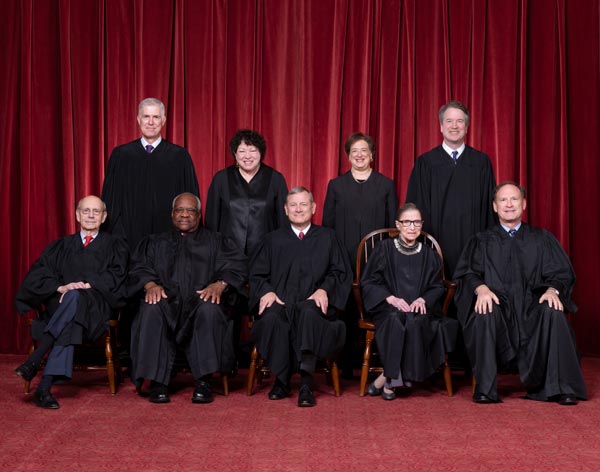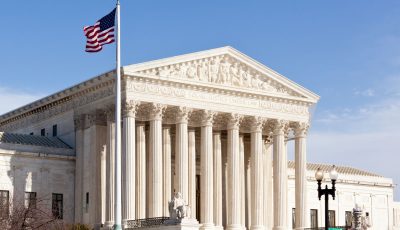Supreme Court sidesteps ‘Insular Cases,’ hints at future action

Front row, left to right: Associate Justice Stephen G. Breyer, Associate Justice Clarence Thomas, Chief Justice John G. Roberts, Jr., Associate Justice Ruth Bader Ginsburg, Associate Justice Samuel A. Alito. Back row: Associate Justice Neil M. Gorsuch, Associate Justice Sonia Sotomayor, Associate Justice Elena Kagan, Associate Justice Brett M. Kavanaugh. (FRED SCHILLING/COLLECTION OF THE SUPREME COURT OF THE UNITED STATES)
The U.S. Supreme Court upheld Monday the constitutionality of presidential appointments to Puerto Rico’s PROMESA oversight board, but failed to use the opportunity to overrule the Insular Cases.
Justice Stephen Breyer wrote for the seven-justice majority, which reversed a unanimous decision by the 1st Circuit Court of Appeals and held that the President is not required to obtain the advice and consent of the Senate when appointing members to the board because they are not “officers of the United States” for the purposes of Article II of the U.S. Constitution.
However, despite taking nearly eight months to issue a decision, the high court did not entertain requests from both sides to “overrule the much-criticized ‘Insular Cases’ and their progeny.” The Insular Cases, widely criticized as a doctrine of “separate and unequal” and “central documents in the history of American Racism,” remain a controversial foundation for disparate treatment and discrimination in U.S. territories under the Constitution. The lower appellate court decision that the Supreme Court reversed on Monday had suggested that the specter of the Insular Cases “hovers like a dark cloud” over the dispute.

Neil Weare
“Today’s decision is a disappointing missed opportunity by the Supreme Court to account for some of its most troubled and appallingly racist precedents,” said Neil Weare, president and founder of Equally American, a nonprofit that advocates for equality and civil rights for the nearly 4 million U.S. citizens living in the territories. “At the same time though, the [high] court laid important groundwork for future challenges where the Insular Cases may be more squarely presented.”
At the Supreme Court oral argument, Puerto Rican attorney Jessica Mendez Colberg—representing Unión de Trabajadores de la Industria Eléctrica y Riego—made history by expressly calling on the Supreme Court to overrule the Insular Cases. Her advocacy accompanied a sustained effort by Equally American and others to lay a foundation for these vestiges of American overseas imperialism to be permanently cast out of U.S. constitutional law, as Equally American argued in an amicus brief filed in the case.
Justice Sonia Sotomayor wrote extensively in a concurring opinion about the consequences of the ruling, noting that many of the key issues surrounding the constitutionality and powers of the board were outside the bounds of the narrower Appointments Clause issue that was before the high court. Noting that the majority “does not meaningfully address Puerto Rico’s history or status,” Sotomayor expressed a more fundamental concern that the oversight board represents an attempt by Congress to abrogate the compacts and guarantees of self-government Congress has promised to the Puerto Rican people, replacing elected governors and legislatures with an undemocratically-selected oversight board. Though concurring in the result of the case, Sotomayor called the oversight board “a twilight zone of accountability, neither selected by Puerto Rico itself nor subject to the strictures of the Appointments Clause,” admonishing that “territorial status should not be wielded as a talismanic opt out of prior congressional commitments or constitutional constraints.”
Although the Supreme Court failed to take on the Insular Cases on Monday, other cases challenging this precedent is in the pipeline. A new wave of cases stands to raise these issues once again, and in less narrow legal contexts than Aurelius. Equally American is playing an active role in a number of these cases, including Fitisemanu v. United States, a case in which a U.S. district judge in Utah recently struck down the federal statute that labels people born in American Samoa—a U.S. territory since 1900—as “nationals, but not citizens, of the United States.” The Fitisemanu decision has been fully briefed on appeal before the U.S. Court of Appeals for the 10th Circuit, with an oral argument expected in the coming months.
“The Supreme Court’s decision on Monday demonstrates that the Insular Cases are not going to go down without a fight,” said Gretchen Sierra Zorita, principal at Polivox787, who serves on the board of Equally American. “The constitutional rights of the nearly 4 million U.S. citizens living in the territories—98% of whom are racial or ethnic minorities—should concern every American who cares about civil rights and racial justice.”(PR)



























